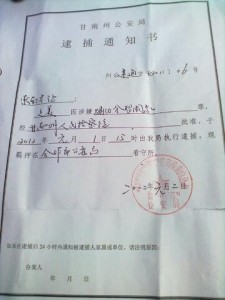
In his first speech as the United Nations’ High Commissioner for Human Rights, Zeid Ra’ad Al Hussein declared “courage is the first human virtue… The courageous individual is he or she who has nothing to wield but common sense, reason and the law, and is prepared to forfeit future, family, friends and even life in defence of others, or to end injustice.”
On the same day that High Commissioner Al Hussein opened the 27th Session of the Human Rights Council in Geneva with these strong words, Radio Free Asia reported that Jigme Gyatso of Labrang Monastery in Gannan (Tib: Kanlho) Tibetan Autonomous Prefecture in Gansu Province had been sentenced to five years in prison for “splittist activities.” This is the first news of Jigme Gyatso since the Tibetan Centre for Human Rights and Democracy (TCHRD) obtained a copy of Jigme Gyatso’s arrest warrant in February 2012. The arrest warrant was issued almost five months after Jigme Gyatso was arrested from his hotel room by 40 police officers.
Jigme Gyatso’s arrest in August 2011 was the fourth time he had been arrested in five years. In 2008, after already having been arrested twice, Jigme Gyatso gave a 20-minute interview to Voice of America (VOA). In the interview he described his treatment after he was detained during the 2008 Uprising. Jigme Gyatso described how during his detention, he was kept continuously handcuffed in one position for many days and nights. During interrogation sessions he was suspended from the ceiling while his interrogators beat him and told him he must confess. One interrogation session lasted two days and Jigme Gyatso was not allowed to eat or drink. Twice, during the interrogation sessions, Jigme Gyatso lost consciousness. The second time he was unconscious for six days and returned to his family once he regained consciousness because he was on the verge of dying.
In the VOA interview, Jigme Gyatso described how he learned that 180 monks, including the most senior monk and the monastery’s official lama, had been arrested and forced to stand on the tips of their toes all the night while guards beat them with the butts of their rifles. Recognizing the risk he was taking by giving the interview, he also mentioned that other monks who spoke to reporters had their legs broken by baton, or were driven insane by the use of electric batons on their heads and in their mouths.
Despite the risks, Jigme Gyatso did not try to hide his identity when he spoke to VOA. One month after the interview was aired, Jigme Gyatso returned to Labrang Monastery from hiding. Seventy armed police surrounded Jigme Gyatso’s quarters in Labrang monastery and arrested him. After six months and the efforts of two Chinese human rights lawyers, Li Fangping and Jiang Tianyong, Jigme Gyatso was released.
Jigme Gyatso continued to live in Labrang Monastery. He was arrested for the fourth time in August 2011. This time, 40 police officers surrounded his hotel room. Monks and students who were at the hotel asked why Jigme Gyatso was being arrested but the police refused to answer and denied that Jigme Gyatso was in the room, even though he could be heard speaking and seen through the windows. The next day, 50 police officers searched his room in Labrang Monastery and took his computer, CDs, and photos of the Dalai Lama.
The Chinese government refused to provide any information about Jigme Gyatso’s treatment or condition and his friends and family worried that he was being denied medical care. Local authorities prohibited two Beijing rights lawyers, Wang Yajun and Zhang Kai, who had been contacted by his friends and family, from representing him. The lawyers learned that Jigme Gyatso had been charged with “Suspicion of instigating anti-nationalist separatism,” received a hearing in early 2012 with court appointed local lawyers, and was sentenced immediately after the hearing. They were unable to learn anything about how Jigme Gyatso was being treated or his health. With no other options, Jigme Gyatso’s friends petitioned the United Nations to intervene on his behalf.
In his VOA interview, Jigme Gyatso said his main hope was that the international media and the United Nations come to Tibet and report on what was happening. By November 2012, UN Special Rapporteurs had 12 unanswered requests to visit and assess the situation in Tibet. Despite the People’s Republic of China’s (PRC) acceptance of the recommendations during October 2013 Universal Periodic Review to facilitate a visit by the High Commissioner for Human Rights, this has not happened.
Now is the time for the Office of the High Commissioner for Human Rights to act. High Commissioner Al Hussein must not allow the PRC’s rationalizations and excuses to hide the suffering of courageous activists like Jigme Gyatso. As the High Commissioner recognized, “Our tragedy, our curse, as human beings, is therefore hauntingly simple: every evil can be rationalized. … Another lesson for me, twenty years ago, was equally clear: there is no justification ever, for the degrading, the debasing or the exploitation of other human beings.”
Jigme Gyatso’s interview with VOA and his continued work for Tibetans is the embodiment of the courage High Commissioner Al Hussein called “the first human virtue.” TCHRD urges High Commissioner Al Hussein to intervene on Jigme Gyatso’s behalf and to not fall into the trap of Chinese rationalizations.
